- Home
- Penelope Lively
Judgment Day Page 2
Judgment Day Read online
Page 2
The new houses rose from the rubble of the old. The raw earth of their fenced gardens sent forth lawns and paving from the garden center and neatly spaced and labeled shrubs and, in summer, padded and canopied seats and hoses with sprinkler attachments. Sydney got to know their occupants by name: the Marshalls and the Haddows and the Coggans.
And the Bryans, next door. Keith and Shirley. And the child, Martin.
The Bryans did not have a lawn with a sprinkler, or labeled shrubs. Their garden plot remained much as the builders had left it: things seeded themselves and grew haphazardly, rank clumps of grass, groundsel, and chick-weed. The boy played in it, alone. From time to time someone planted lobelia or african marigolds, forgot to weed or water, and the flowers shriveled or were smothered.
Sydney Porter, his morning already planned—hoe the seedbeds, cut the grass, tie back the climber if time—came out of the house and went over to the potting-shed. There, he selected a hoe from the row of garden tools. The tools, blades and tines wiped clean of earth, hung in gradation on the wall, orchestrated from long-handled fruit-tree pruners to wooden bulb dibber. Flower-pots were stacked in columns; hanks of twine were ranged on hooks; sprays and fertilizers were lined up on a shelf. Sydney went over to the vegetable plot and set to work.
“I can never see what people get out of gardening. You're always at it, Mr. Porter, aren't you?”
She seemed to be forever yawning, Shirley Bryan. Yawning and scratching an armpit. She stood at the fence now, doing just that, a fluffy-haired girl with a bad complexion.
Sydney paused. He thought. Eventually he said, “It's having control over something, I suppose. Knowing what will happen.”
“If I try to grow things they just flop over and die, or something eats them. You can't win.”
“You get the odd bother,” said Sydney smoothly. “Not enough to put you off altogether.” He went back to the hoeing: thrust and back, just deep enough to clip the seedling weeds, a wake of tiny wilting shoots behind him, french beans pushing up nicely to right and left. Shirley Bryan continued to watch, arms akimbo along the top of fence.
“Keith's got his promotion.”
“Very nice.”
He wished she'd go away.
“Five hundred and a Granada at the end of the year.”
“Ah.”
“Not that much of it'll come my way, I daresay.” She yawned again. “Hey, there's Martin's ball under that bush of yours. He was on about what had happened to that last night. D'you mind chucking it over, Mr. Porter. Thanks a lot.”
The boy, over the years, had left infancy behind, topped the garden fence, acquired footballs and guns. He was a thin, pale-faced child, quiet, to Sydney's relief. Quiet and rather solitary, playing mostly by himself, strange furtive games along the fence and among the bushes and saplings that, eventually, had grown and furnished the end of the Bryans' garden.
He did not play with the Coggan children, next door on the other side, the two tidy, fair-haired little girls. Neither did the Bryans consort much with the Coggans, Sue and John. John Coggan of E. J. Coggan & Son, Estate Agents, 14 High Street, Laddenham. A different type of family, Sydney could see, more homely people, the garden spruce, Sue Coggan regular as clockwork trundling her pushchair along to the shops, in later years hurrying the girls to school, off to collect them at three-thirty.
Martin Bryan took himself to school, brought himself home.
John Coggan sat on the Parish Council and was chairman of the Parent Teacher Association. A stocky, brown-haired man, running to fat a little, nicely paired with Sue, so small and trim and fresh-faced beneath her shiny fair fringe.
The Coggans, all four, attended Matins every Sunday; the Bryans, never.
The Bryans, the Coggans, Sydney Porter, George Radwell—for all these people Laddenham had come to seem a satisfactory choice. A nice locality, Sue Coggan thought, a lovely house, plenty of children for the girls to play with. Five miles from the motorway, Keith Bryan would say, two hours dead to Piccadilly. George Radwell found it a great deal pleasanter than north London. Not being a thoughtful man, he had never dwelt on the slippery nature of choice in human affairs; he felt that he had chosen Laddenham, just as he had come to feel that he had chosen to go into the Church.
Sydney Porter, who had long since ceased to take much interest in questions of choice or blind accident, simply moved through the days, doing what had to be done. He quite liked Laddenham; it was as good a place as any. You had to feed up the soil a bit, but there was no clay. Things went on the same, on the whole, year in, year out. The odd fuss about a planning permission or a road scheme, but nothing to disturb, really. Hardly ever.
Just sometimes, nowadays, the motorbikes. Roaring through the Green, always after dark, deep into the night, a gang of them, shattering the quiet like an explosion, the more violent because unexpected. The first time the din had had him half out of bed, wrenched from sleep, his heart thumping. And then they were gone so quickly he thought he might even have dreamed the sound. But they'd been back a week later, circling the Green two or three times.
Thus the place, the people. In random association.
Chapter Two
I have no friends, said Clare Paling to the bathroom ceiling. I am married to a man who is sweeping all before him in the electronics industry and I have no friends. I live in a big expensive house that would be the envy of many. I am a crack cook. My husband's success is such that it keeps him from home five and a half days out of seven and ten hours out of twenty-four. I am well educated, considered good-looking, an experienced driver and I have no friends. I don't have a lover either.
Downstairs, the house rocked to the din of sibling warfare. Clare turned the hot tap on.
I have a new white mini and the most expensive brand of dishwasher on the market. I can read Anglo-Saxon, speak French, respond to metaphysical poetry and I have no friends. I have no friends because all the people I used to know live somewhere else and I am somewhat off-putting in manner. I off-put by speaking sharply and smiling too expansively. When I am getting bored I show my teeth. I've seen, in mirrors. I grin and grin and there are my teeth, large and looking more yellow than they really are.
Downstairs, a television exploded into sound.
I have a happy marriage and a father who is a big wheel at the Treasury. When I look at my children I know that they are the most wonderful creatures I have ever seen and I do not know whether to exult or to weep. I read books and the world appalls me. Sometimes I wake in the night and shiver. And then I walk out into the beauty of it and I am amazed. All my life I have wondered how we endure it as we do, knowing what we know.
Sometimes I feel so charged with energy that I think I might burst out of my skin. Walking across the recreation ground I know that I could go on forever without stopping, without ever tiring, could walk off the face of the earth. They should use people like me to power industries. Solve the energy crisis just like that.
She turned the tap on again. Sang. In a deep voice, not bad sounding. Excerpts from Carmen.
* * *
Sue Coggan, a hundred and ten yards away, washed the tea things and thought: if we have another next year, when Tracy's just turned six, October would be best, well after the summer holidays and before Christmas, so I'd be up and about in good time for the shopping. Three's a nice number—two girls and a little boy—touch wood, cross fingers. She dried the dishes and took her diary from the kitchen shelf. We ought to start it in January, in that case. The diary for this year showed January of next as a series of black lines, one for each week. In the second was penciled “Car for 6,000 mile service” and in the third, “Holiday bookings. Dad's birthday.” Sue took a ball-point, hesitated, made a cryptic red asterisk in the first week. The christening on Boxing Day, she thought, nice, when the parents are here, and I'll have a new winter coat, one of those full-backed ones, in a light tweed. And the girls in little matching dresses.
She went to the window and saw Martin Bryan outsi
de on the pavement. Lurking behind the low brick wall, his head surfacing above it every now and then. Playing something. Not watching telly like any other child would be at this point in the day. A sad sort of kid really, but what could you expect, parents like that? Sue frowned to herself and shook her head, thinking of Shirley Bryan—such a slut, and forever on the borrow—out of this, out of that, can I scrounge half a loaf, a cup of sugar, forgot to go to the shops. Mucky house. Keith Bryan fiddling his expenses without a doubt, all those jazzy clothes, the two of them off out to the roadhouse on Saturday nights and Martin left alone in the house as like as not, maybe one shouldn't be turning a blind eye, but what could you do?
* * *
Count ten and then look over the wall again. If it's all clear, sprint up the path. Head down in case they fire from the window. Eight, nine, ten. They're looking. Down again. Keep crouched, they may shoot, they may…
I'm cold, Martin thought. He had no jersey on. He didn't know where the sweater was, couldn't be bothered to look for it. He didn't know where Mum was, either. She'd left bread and peanut butter for tea on the kitchen table and a note saying back later. Probably she'd gone to the pictures in Spelbury. The telly wouldn't work again, she'd forgotten to get the man to come. That meant they'd go out tonight to the pub. They couldn't sit in if there was no telly.
He peeked over the wall again. She'd seen him now, Mrs. Coggan, she was frowning at him and shaking her head. He'd better go. It was raining, anyway. He'd have liked to watch their telly, it would be “Extraordinary”; but that would mean asking, and he couldn't.
* * *
Keith Bryan, phoning home to say he'd be late (bit of a hassle over an order gone astray, have to stay on and do some paper work}, let it ring ten times and thought, well, blow that, she can't say I didn't try. He felt a bit let down—the story all lined up and then no one to say it to. He put on his jacket and went down the stairs two at a time and into the car park.
He felt better, with the Capri round him, driving into the heavy traffic on the bypass, nosing at the taillights of some silly bugger in an old Morris who thought he could cope with the fast lane. That was more like it; that was how to sort out the sheep from the goats. The headlights swept the dark road; John Travolta snarled away about love on Radio One; he'd have liked to go on like this for hours, not just the five mingy miles to the Green Man. The Green Man where Mrs. Comstock of Barrow and Co., Debbie Comstock, her with the blond hair and throaty voice, would be waiting to have a talk over a drink about that joint marketing project. Very nice too. He began to sing along with John Travolta. For a few minutes you could forget the boundaries: the eight thousand a year and fringe benefits; the three-bedroom twenty-six thousand five hundred detached with double garage. Shirley. Himself. You were up, up and away. Ten feet tall. A man could breathe.
* * *
The Parochial Church Council, gathered round the vicarage dining-room table, had read and digested the Diocesan Architect's report. They were in the process, now, of taking in the full implications of the estimate presented by the firm of church restoration experts recommended by the Diocesan Architect. George Radwell, bemused, had wondered at first if the figures were a bit wild; could all those naughts be correct? Even Sydney Porter, despite his profession, had been taken aback. But Jim Squires, brother to Squires the builder, had said yes, they could be, it's the scaffolding, see, the labor, and all that lead, and the guttering, and this rot in the vestry, and the pinning above the porch. It's not tuppence, nowadays, all that. Miss Bellingham had sighed and tutted and said everything was so dear, only last week she'd had a bill for fifty-seven pounds from the garage. Fifty-seven pounds, I ask you!
The church, seen through the vicarage window, looked solid enough, hunched there in the dusk, though dwarfed, admittedly, by the wall of the car park and the two-story block of luxury flats behind the Amoco garage. Smaller, perhaps than once it had been—or seemed to be—but enduring enough, surely? This catalog of ills was somehow indecent, this chronicle of decay and disease and infirmity, as though some reticent old lady had foisted on you chapter and verse of her medical history. The Parochial Council, in flight from the problems that lay on the table before them, this dizzying sheaf of figures and prognostications, gazed out of the window and confronted the situation each according to his or her own lights.
Miss Bellingham thought new altar cloths would be an idea while they were about it, and the floor polisher was on its last legs.
Sydney Porter wondered if you could perhaps get the total down a bit by bringing in a local firm, at least for the more straightforward work, Jim Squires—his brother in mind—nodded sagely.
Mrs. Harrison said briskly that of course the Mothers' Union would have a Jumble Sale, several if necessary. And the fete proceeds could be diverted from the Christian Aid Fund.
George thought about fifty thousand pounds. The figure printed itself on the window, with curlicues and loops and squiggles like the majestic script on old five-pound notes, the big white ones. Through the phantom script he saw the black of the road, shiny in rain, the fresh green of the willow in the Coggans' garden, the golden fabric of St. Peter and St. Paul, crouched there in reduced circumstances. He saw Mr. Paling's car go by, slowing down to turn into his garage. The sight of this brought Mrs. Paling to mind: she floated into the center panel of the window and hung there like, and yet most unlike, the Virgin in the north window of the church. She hung there, grinning, and then, most deliberately, removed her blouse.
“…some sort of anniversary celebration,” said Miss Bellingham. And then, more sharply, “What do you think, Vicar?” The Parochial Council sat in expectation, looking at George, while George stared at the window in which Mrs. Paling, grinning still, had begun to dissolve until there was nothing to be seen but her teeth, like the Cheshire Cat. “Quite,” he said, “I was just about to suggest it myself, I'm entirely with you.”
* * *
“Are you joking?” said Clare Paling. She looked at her husband across the kitchen table, over the remains of pigeon casserole and a not-bad bottle of plonk from the supermarket. “No, you're not, I see. What do you propose? Shall I run for presidency of the Women's Institute?”
Peter Paling, at thirty-five, had a receding hairline. It had begun its recession in his late twenties and had been the subject of a running joke between Clare and Peter, to do with those uncertain fellows in London tube advertisements, restored to confidence and potency by a nifty grafting job. Peter, lacking neither, would live with his increasing scalp exposure and indeed subtly turn it to his advantage. He was one of these men who look not exactly older than their years but as though they have profited from them rather more than most; a youngish man with the substance of an older one.
He was recommending to his wife that she take part in local activities. He had also mentioned, in passing, that a new European connection of the firm's would mean he had to spend several days a month in Brussels.
“I daresay you've got a point,” Clare went on amiably, “I need occupation. The local schools are fully staffed, so there are no openings for me there. Since I am no good with my needle I am not likely to start the cottage industry that will become the Laura Ashley of the nineteen-nineties. I can't stand dogs or horses so it's no good trying to crash county circles. I am totally unathletic. Gardening appalls me. So you think I should take up good works?”
She had given up her publishing job when they moved to Laddenham. Do you mind? he had said guiltily, standing there with the letter in his hand, the letter propelling him several rungs up the ladder, the countryside's quite pretty, I'm told, are you sure you won't mind? And she had answered, truthfully as it happened, that she didn't. I am not, she had said, you must realize, particularly ambitious. Industrious, in my way, yes; ambitious, no. You will have to take on the ambition part, you're better at it. No, I don't mind. I shall be perfectly happy reading books I want to read instead of those I have to read. A period of tranquil reflection will do me no harm at al
l.
She had seen it coming. In the early days of their marriage, the delectable time in London and on the European tour, she had known that this wouldn't last. Promising young men, destined for ultimate stardom, must spend a period in the thick of things, not in air-conditioned city center offices but where the objects for distribution are actually made. Light industry is mainly situated well outside London, in expanding and usually—for that reason, no doubt—unappealing towns. The Laddenham job had come as no surprise.
He filled her glass.
“I thought we were only drinking half. We shall have hangovers.”
“A little dangerous living might be a good thing.”
“All living,” said Clare, “is dangerous.”
“You, my love, are a fatalist. You spend your life expecting the worst.”
“A hostage to fortune.”
“It's all this reading. You'll do your eyes in, apart from anything else. Are those the new glasses?”
“Do you like them?”
“They're sexy,” said Peter, “in a peculiar way.”
“Oh, good. You think books foster pessimism, then?”
“Well,” he said cautiously, “I've never gone in for them on your scale, so my judgment might lack bite, but on the whole I've always found real life a lot more prosaic.”
“Are we talking about fact or fiction?”
“Novels,” said Peter, “always pose situations which are either extreme or telescope time, as it were. Life mostly isn't like that.”
“True, up to a point. They are supposed to tell a story, of course.”
“History, on the other hand, which I find all over the house these days, is full of disaster, but large tracts of it, for many people, are really quite uneventful.”

 The House in Norham Gardens
The House in Norham Gardens Family Album
Family Album Life in the Garden
Life in the Garden Oleander, Jacaranda: A Childhood Perceived
Oleander, Jacaranda: A Childhood Perceived Cleopatra's Sister
Cleopatra's Sister Next to Nature, Art
Next to Nature, Art A Stitch in Time
A Stitch in Time Moon Tiger
Moon Tiger The Photograph
The Photograph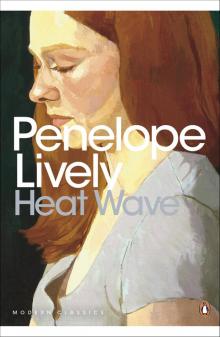 Heat Wave
Heat Wave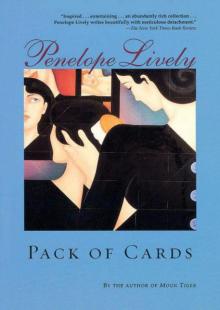 Pack of Cards
Pack of Cards Spiderweb
Spiderweb How It All Began
How It All Began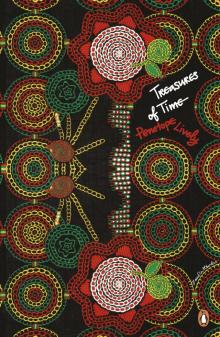 Treasures of Time
Treasures of Time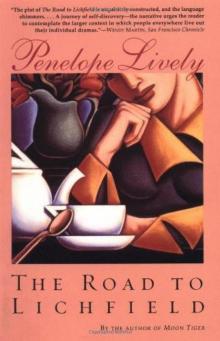 The Road to Lichfield
The Road to Lichfield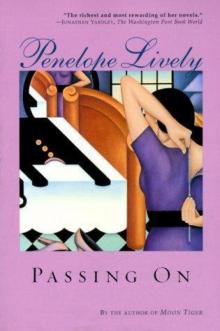 Passing On
Passing On Making It Up
Making It Up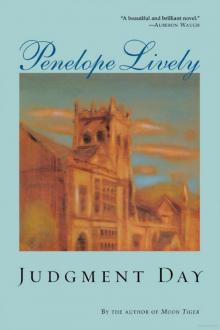 Judgment Day
Judgment Day The Purple Swamp Hen and Other Stories
The Purple Swamp Hen and Other Stories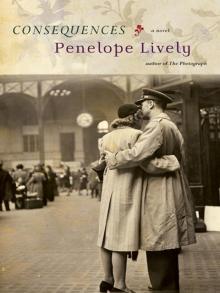 Consequences
Consequences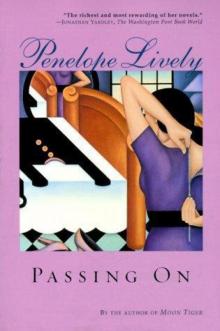 *****Passing On*****
*****Passing On*****